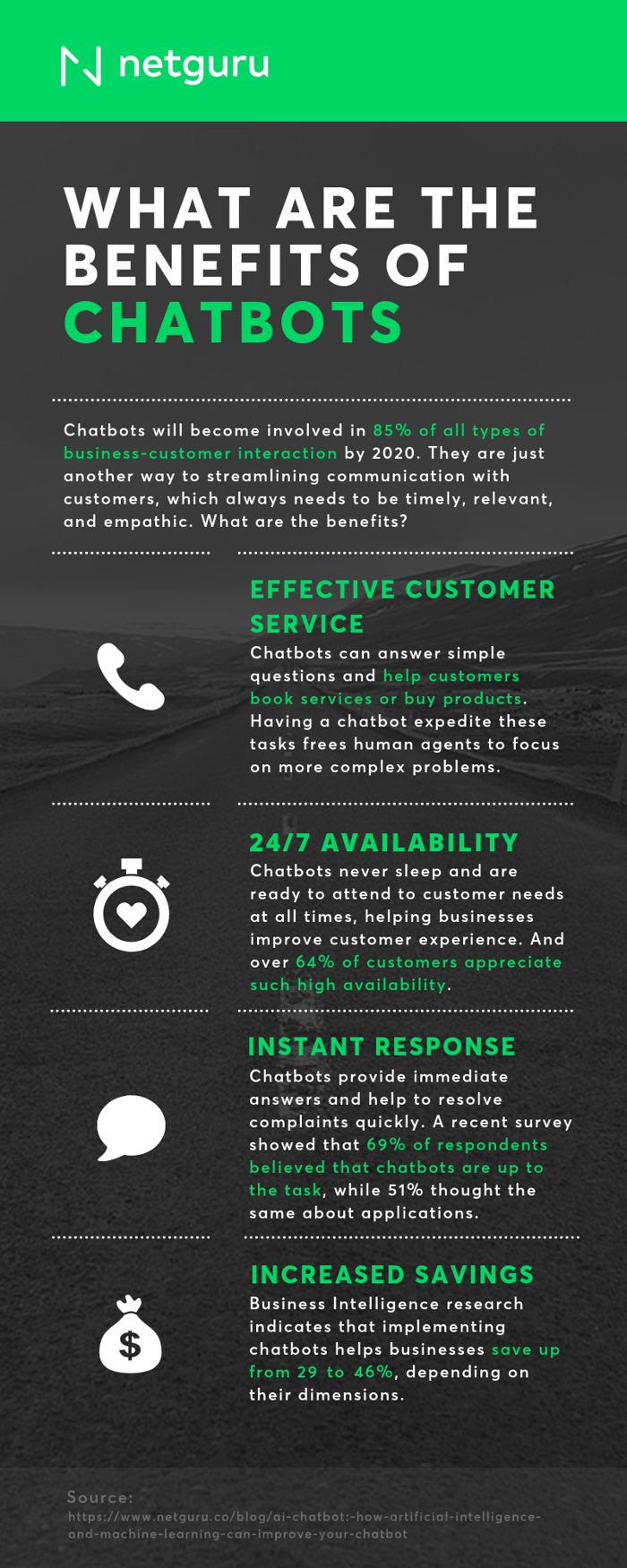AI Chatbot: How Artificial Intelligence and Machine Learning Can Improve Your Chatbot

Businesses that want to connect with their target audience via a chat need to be quick in responding. According to a study from InsideSales and Harvard Business Review, a delay of 5 minutes can have catastrophic results on lead generation. After making their customers wait for 10 minutes, businesses reduce their chances to get an effective contact up to 400%.
That's where chatbots come in. Consumers expect to get an immediate response, and businesses can offer it by using chatbots that provide split-second reactions to customer queries and are programmed to handle the entire conversation just like a human customer representative.
But that's not the only benefit chatbots bring to businesses.
Key benefits of chatbots
Businesses use chatbots for a variety of reasons. Here are some of them:
-
Effective customer service: chatbots can answer simple questions and help customers book services or buy products. Having a chatbot expedite these tasks frees human agents to focus on more complex problems.
-
24/7 availability: chatbots never sleep and are ready to attend to customer needs at all times, helping businesses improve customer experience. And over 64% of customers appreciate such high availability.
-
Instant response: chatbots provide immediate answers and help to resolve customer complaints quickly. A recent survey showed that 69% of respondents believed that chatbots are up to the task, while 51% thought the same about applications.
-
Increased savings: Business Intelligence research indicates that implementing chatbots helps businesses save up from 29 to 46%, depending on their dimensions.
Now that you know why chatbots are such a useful tool for driving customer satisfaction and loyalty, let's take a look at how artificial intelligence (AI) can improve chatbots.
See how this company uses AI-powered chatbots to streamline sales cycles.Advantages of AI-powered chatbots
Chatbots come in two flavors: rule-based bots and AI bots.
Rule-based bots answer questions on the basis of the predefined rules developers embed into them. These rules can range from simple to very complex. Building this kind of a bot is a relatively straightforward process that takes advantage of various rule-based approaches.
Unfortunately, rule-based bots aren't able to answer questions that exhibit patterns for which these bots weren't designed. That's why AI holds such potential in the area of chatbots. Even if natural language processing (NLP) technologies aren't perfect yet, machine learning algorithms are helping chatbots get closer to a point where customers will find it challenging to distinguish between human and machine customer reps.
Chatbots programmed to do more than just answer questions require AI that would allow them to learn from the interactions with end users. What lies behind these learnings are advanced analytics platforms and API integrations that feed the AI with resources that help the chatbot come up with correct and relevant answers.
Here's how businesses can start implementing AI chatbots
Rule-based chatbots aren't more complicated to develop than web apps – but only as long as you know exactly what kind of problems you want them to solve.
That's why the first step is making a business case for your bot:
-
What problems will it help you solve? For example, it will relieve your overworked customer service reps.
-
What kind of business objectives will it help you achieve? A business goal can be increasing the number of solved customer queries or reducing the waiting time.
-
Who will be the target audience of your bot? You can use chatbots for customer service, but also with your employees for the purposes of internal training or services.
AI-powered chatbots are more advanced and need to be developed by a team of experts who are proficient in building AI solutions.
For a chatbot to work, you need to know the exact points for when and why customers reach out to you. Understanding the finer details of the customer journey and having the accurate foresight is essential to programming AI chatbots. The chatbot triggers need to be designed in a way that seamlessly guides the customer through the sales funnel.
The primary goal of AI chatbots is bridging the gap between machines and people. To successfully implement a chatbot, you need to put yourself in the shoes of an average customer and develop your chatbot around their path towards the purchase.
But as you do that, don't lose the human touch. It's best to develop chatbots with a full understanding of the popular pain points throughout the customer journey and present empathic answers to connect with users emotionally.

Chatbots are the future
According to Juniper, chatbots will become involved in 85% of all types of business-customer interaction by 2020. A survey conducted by Oracle showed that 80% of senior marketing and sales professionals expect to be using chatbots for customer interactions by 2020.
Even if they seem to be a cutting-edge technology, chatbots are just another way to streamlining communication with customers, which always needs to be timely, relevant, and empathic.
There's no denying that chatbots are on their way to becoming a dominating technology trend in customer service and beyond. Don't stay behind and get in touch with our team of experts to create a chatbot for your business and stay ahead of the curve.









